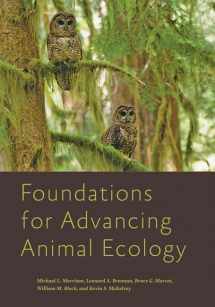
Foundations for Advancing Animal Ecology (Wildlife Management and Conservation)
Book details
Summary
Description
Product Description
A look at how wildlife professionals can modernize their approaches to habitat and population management with a fresh take on animal ecology.
How can we maximize the probability that a species of wild animal will persist into the future? This audacious book proposes that advancing animal ecology―and conservation itself―demands that we reenvision our basic understanding of how animals interact with their environments and with each other.
Synthesizing where we are and where we need to go with our studies of animals and their environs, Foundations for Advancing Animal Ecology asserts that studies of animal ecology should begin with a focus on the behaviors and characteristics of individual organisms. The book examines
• the limitations of classic approaches to the study of animal ecology• how organisms organize into collections, such as breeding pairs, flocks, and herds• how the broader biotic and abiotic environment shapes animal populations, communities, and ecosystems• factors underlying the distribution and abundance of species through space and time• the links between habitat and population• why communication between researchers and managers is key• specific strategies for managing wild animal populations and habitats in an evolutionary and ecosystem context
Throughout, the authors stress the importance of speaking a common and well-defined language. Avoiding vague and misleading terminology, they argue, will help ecologists translate science into meaningful and lasting actions in the environment. Taking the perspective of the organism of interest in developing concepts and applications, the authors always keep the potentially biased human perspective in focus.
A major advancement in understanding the factors underlying wildlife-habitat relationships, Foundations for Advancing Animal Ecology will be an invaluable resource to professionals and practitioners in natural resource management in public and private sectors, including state and federal agencies, non-governmental organizations, and environmental consultants.
Review
Considering the behaviors and characteristics of individual organisms as a foundation, this book encourages readers to be critical of wildlife studies and our approach to understanding the ecology and habitat of the animals we manage. This is a critically important learning objective for students in wildlife ecology and conservation. -- Serra J. Hoagland
The authors' approach of identifying interacting individual animals is original and arguably necessary to gather meaningful results that will inform land management practices compatible with species persistence. This approach provides a new paradigm for study design in research on wildlife-habitat relationships. -- Victoria A. Saab
Book Description
A look at how wildlife professionals can modernize their approaches to habitat and population management with a fresh take on animal ecology.
About the Author
Michael L. Morrison is a professor and the Caesar Kleberg Chair of wildlife ecology and conservation at Texas A&M University. He is the author of
Restoring Wildlife: Ecological Concepts and Practical Applications and the coauthor of
Wildlife-Habitat Relationships: Concepts and Applications and Wildlife Study Design.
Leonard A. Brennan is a research scientist and is the C. C. Winn Endowed Chair for Quail Research Professor at the Caesar Kleberg Wildlife Research Institute, Texas A&M University–Kingsville. He is the coeditor of
Quantitative Analyses in Wildlife Science.
Bruce G. Marcot is a research wildlife biologist with the USDA Forest Service, Pacific Northwest Research Station, and the coauthor of
Wildlife-Habitat Relationships: Concepts and Applications.
William M. Block is scientist emeritus with the USDA Forest Service, Rocky Mountain Research Station. He is the coauthor of
Wildlife Study Design.
Kevin S. McKelvey is a research ecologist with the USDA Forest Service, Rocky M


We would LOVE it if you could help us and other readers by reviewing the book
Book review



